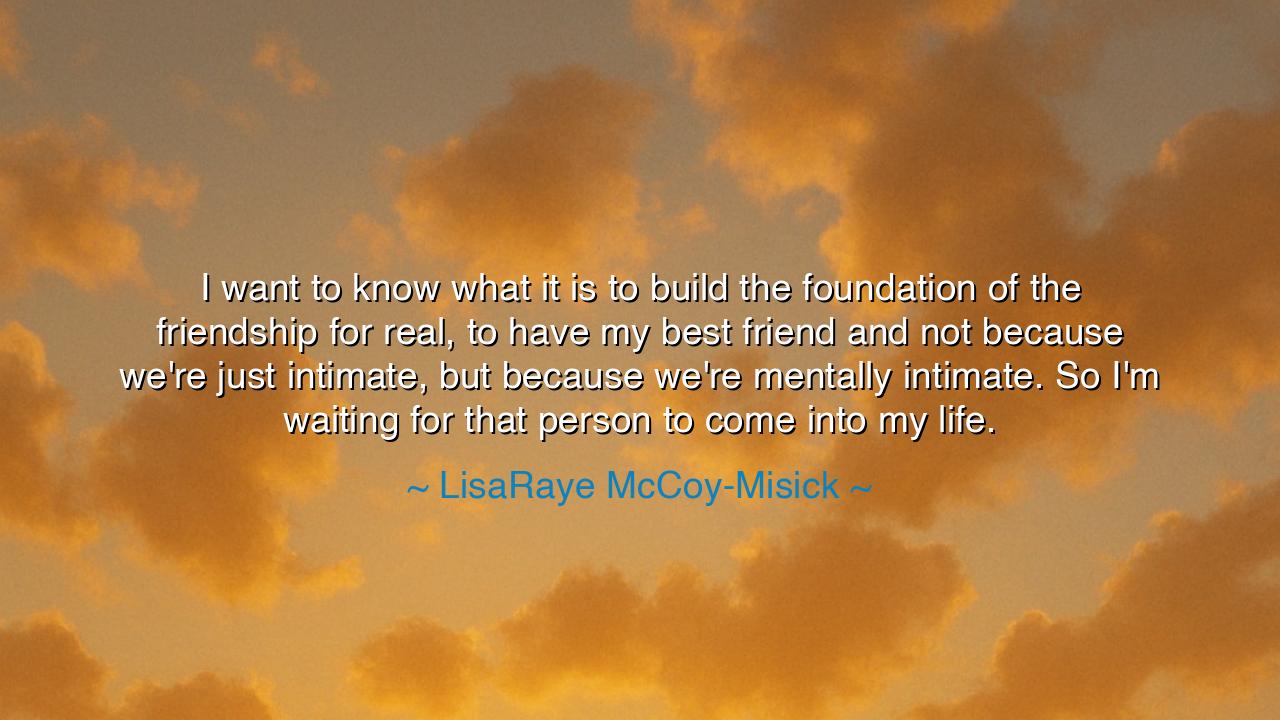
I want to know what it is to build the foundation of the
I want to know what it is to build the foundation of the friendship for real, to have my best friend and not because we're just intimate, but because we're mentally intimate. So I'm waiting for that person to come into my life.






In her reflection, Jill Scott, a woman of song and soul, speaks from the deep wisdom of experience: “I’ve learned that friendship does not equate business, business does not equate friendship.” These words are not merely about commerce or contracts, but about the boundaries of the heart. They come from a truth earned through living — the realization that affection and trust, though sacred, cannot always guide the dealings of the practical world. Scott reminds us that even among friends, clarity must guard compassion, lest goodwill turn to grief.
The origin of this quote lies in Scott’s own journey through the worlds of art and enterprise. As a celebrated singer, actress, and poet, she has navigated both the warmth of creative collaboration and the cold precision of business negotiations. Her words were born from the tension between the personal and the professional — the place where generosity meets expectation, and where loyalty is tested by profit. In the music industry, as in life, it is easy to blur the line between friendship and business, to assume that affection can replace agreement, or that trust can substitute for truth. Scott, seasoned by both joy and betrayal, learned that such blending often leads to heartache.
At its heart, her statement is about wisdom through separation — the discipline of honoring each sphere for what it is. Friendship thrives on empathy, forgiveness, and shared vulnerability. Business, by contrast, depends upon accountability, structure, and fairness. When these two realms are confused, harm is done to both: the friend feels used, and the deal becomes personal. True maturity lies in recognizing that one can love another deeply and still uphold boundaries; that respect, not sentiment, must govern all exchanges where stakes and livelihood are at play. To mix them without care is to invite confusion and resentment.
History too bears witness to this lesson. Consider the story of Thomas Edison and Nikola Tesla, whose early friendship was forged through mutual admiration and collaboration. Edison, already a famed inventor, employed Tesla with the promise of reward for innovation. But when the time came, misunderstanding and differing expectations shattered their bond. What began as partnership ended in bitterness — a wound born not from malice, but from the failure to distinguish friendship’s warmth from business’s demands. Their story stands as a timeless echo of Jill Scott’s truth: affection does not exempt one from clarity, nor should clarity be mistaken for cruelty.
There is also something noble in the pain of her realization. To say “I’ve learned” is to confess a wound healed through time. It suggests that Scott once believed in the natural merging of trust and transaction, and that she had to learn, perhaps painfully, that the heart and the ledger must remain distinct. Yet this learning does not make her cynical — it makes her whole. For it teaches balance, not division. It is not that friendship and business cannot coexist, but that they must walk side by side, not one within the other. Friendship should add grace to business, not cloud it; business should honor friendship, not exploit it.
In her wisdom, we hear the voice of countless souls who have faced the same trial — the entrepreneur who loses a friend over money, the artist who confuses kindness for contract, the leader who must choose fairness over affection. The struggle is ancient: how to lead, trade, and create among those we love without wounding that love. Scott’s words are a compass in that storm — a reminder that even the purest intentions require boundaries rooted in respect.
The lesson, then, is clear and timeless: love without wisdom falters, and work without respect corrupts. In practical action, this means drawing lines with grace. Put agreements in writing, even among friends. Speak plainly where money or power are involved. Do not fear that honesty will harm affection — for truth, spoken early, preserves trust. And when friendship enters the realm of business, let integrity be the bridge that carries both safely across. For as Jill Scott teaches us, the heart must guide the hand, but never blind it — and in that balance lies both peace and success.






AAdministratorAdministrator
Welcome, honored guests. Please leave a comment, we will respond soon